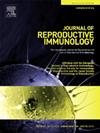Human uterine NK cells express CD96/TACTILE under the regulation of IL-15 and TGFβ1
IF 2.9
3区 医学
Q3 IMMUNOLOGY
引用次数: 0
Abstract
Uterine natural killer (uNK) cells are a tissue-specific subset of innate lymphocytes with unique functions including the engagement with placenta-derived extra-villous trophoblast (EVT) cells. While several receptor-ligand pairs of this interaction have been identified, many remain poorly characterized. Here, we investigated the expression and regulation of nectin-like receptor CD96/TACTILE on human uNK cells, which recognizes ligands expressed by EVT cells. Using flow cytometry, we analysed NK cells from menstrual blood and from first- and second-trimester decidua, alongside peripheral blood cells used as reference. We identified a predominant exon 4-lacking splice variant of CD96 on uNK cells and found that CD96 is part of a broader set of receptors associated with NK cell tissue-residency regulated by IL-15 and TGFβ1. In vitro, IL-15 and canonical as well as non-canonical TGFβ1 signalling upregulate CD96 surface expression. Finally, redirected cross-linking assays showed no major effect of CD96 engagement on degranulation in decidual NK (dNK) cells. Taken together, these findings reveal that human uNK cells adapt to an IL-15- and TGFβ1-rich environment by shifting nectin-like receptor expression, with potential implications for dNK–EVT interactions during placentation.
人子宫NK细胞在IL-15和tgf - β1的调控下表达CD96/TACTILE。
子宫自然杀伤细胞(uNK)是先天淋巴细胞的一个组织特异性亚群,具有独特的功能,包括与胎盘来源的绒毛外滋养细胞(EVT)细胞结合。虽然这种相互作用的几个受体配体对已经被确定,但许多仍然缺乏特征。在此,我们研究了连接素样受体CD96/触觉在人uNK细胞上的表达和调控,该受体识别EVT细胞表达的配体。使用流式细胞术,我们分析了来自经血和妊娠早期和中期蜕膜的NK细胞,以及作为参考的外周血细胞。我们在uNK细胞上发现了CD96的主要外显子4缺失剪接变体,并发现CD96是与NK细胞组织驻留相关的一组更广泛的受体的一部分,这些受体受IL-15和TGFβ1调节。在体外,IL-15和典型及非典型tgf - β1信号传导上调CD96表面表达。最后,重定向交联实验显示CD96参与对个体NK (dNK)细胞的脱颗粒没有主要影响。综上所述,这些发现表明人类uNK细胞通过改变连接蛋白样受体的表达来适应富含IL-15和tgf - β1的环境,这可能影响胎盘过程中dNK-EVT的相互作用。
本文章由计算机程序翻译,如有差异,请以英文原文为准。
求助全文
约1分钟内获得全文
求助全文
来源期刊
CiteScore
6.30
自引率
5.90%
发文量
162
审稿时长
10.6 weeks
期刊介绍:
Affiliated with the European Society of Reproductive Immunology and with the International Society for Immunology of Reproduction
The aim of the Journal of Reproductive Immunology is to provide the critical forum for the dissemination of results from high quality research in all aspects of experimental, animal and clinical reproductive immunobiology.
This encompasses normal and pathological processes of:
* Male and Female Reproductive Tracts
* Gametogenesis and Embryogenesis
* Implantation and Placental Development
* Gestation and Parturition
* Mammary Gland and Lactation.

 求助内容:
求助内容: 应助结果提醒方式:
应助结果提醒方式:


